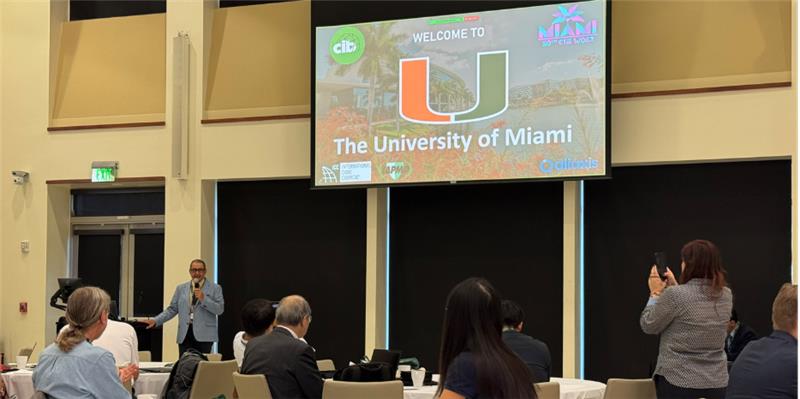
Celebrating Research and Innovation: Highlights from the 50th Annual CIB W062 Symposium
Held from August 24-27 at the University of Miami, the symposium brought together leading researchers, engineers, academics and industry professionals to explore the future of water in the built environment.
This August, Miami, Florida, played host to the 50th Annual CIB W062 Symposium, a landmark event in the world of water supply and drainage systems in buildings. Held from Aug. 24-27 at the University of Miami, the symposium brought together leading researchers, engineers, academics and industry professionals to explore the future of water in the built environment.
The symposium’s broad scope reflected the complexity and interdisciplinary nature of water services and drainage systems in buildings. Topics ranged from water efficient fixtures from Portugal and Belgium, the impact of offsets and air pressure in drainage systems from the United Kingdom, emerging microbial risks from Australia, a dynamic load calculation method from Japan, and more.

ICC Participation
The International Code Council (ICC) participated at this year’s symposium as both a presenter and a major sponsor of the event. ICC’s involvement focused on the implementation of research findings into plumbing standards, as well as ensuring that global research initiatives can contribute to knowledge sharing.
ICC’s Global Director, Tom Roberts, presented on his paper for the development of a unified system for monitoring water known as the “System Performance and Data Extraction (SPaDE),” that was co-authored with Drew Rich and Esber Andiroglu from the University of Miami. This paper introduced a modular framework for real-time monitoring of water systems, integrating IoT sensors and data analytics to improve performance and maintenance.

Technical Sessions & University of Miami’s Research Contributions
As host, the University of Miami played a central role in both organizing and presenting research. Graduate students from the College of Engineering showcased a series of papers that reflected the university’s commitment to sustainability, smart infrastructure and regional resilience.
The CIB W062 symposium welcomed participants from across the globe. Delegates from Europe, Asia, the Americas and Oceania all shared insights into region-specific research and focus areas.
Standout presentations included:
- WISE: A Toolkit for Decentralized Wastewater System Selection, presented by Austin Perry and Esber Andiroglu
This toolkit will help municipalities and developers evaluate decentralized wastewater options based on site-specific constraints and sustainability goals and be used alongside ICC’s 825 standard that will address residential onsite wastewater treatment facilities. - Chemical-Free Nutrient Recovery from Municipal Wastewater: Bench-to-Field Scale, presented by Qiufeng Lin and Esber Andiroglu
This research explored innovative methods for nutrient recovery without chemical additives, offering an eco-friendly approach to wastewater treatment. - Smart Buildings: Application of Water Conservation Measures in Residential Multifamily Construction, presented by Kyrah Williams, Esber Andiroglu, and M. Erkoc
This study examined water-saving technologies in multifamily buildings like garden-style apartments, highlighting both behavioral and technical interventions.
These papers not only advanced academic findings in areas of critical industry needs but also provided actionable insights for practitioners and policymakers. ICC’s collaboration with the University of Miami provides an increased opportunity for industry solution generation.
Presenters also provided an overview of the latest in plumbing research, including:
- Determining Influential Factors of Residential Water Consumption Using Geographically Weighted Regression presented by Drew Rich, Esber Andiroglu, Larissa Montas Bravo, and Nishka Lahiri.
- The Development of a Network Based Stochastic Simulation for Estimating Simultaneous Supply Demand of Plumbing System and its Components presented by Drew Rich and Esber Andiroglu.
The Future of Water Systems
Beyond the technical sessions, the symposium offered moments of reflection and celebration. A gala dinner honored industry pioneers, new graduates and leaders, and revisited the evolution of water system research over the past 50 years.
As the symposium concluded, one message was clear: the future of water systems in buildings is both promising and urgent. With changing climate, antimicrobial resistance, urbanization, water scarcity and aging infrastructures, the need for wholistic, sustainable, intelligent and global solutions have never been greater.
The CIB W062 community left Miami energized, connected and committed to advancing the science and practice of water services and drainage systems. Whether through new knowledge, smarter technologies or more inclusive standards, the work ahead will shape not just buildings, but the health, safety and sustainability of communities worldwide.
You can explore the full itinerary and academic submissions on University of Miami’s official symposium page.
To access any of ICC’s PMG-related resources, click here. To subscribe to the PMG newsletter, click here.







